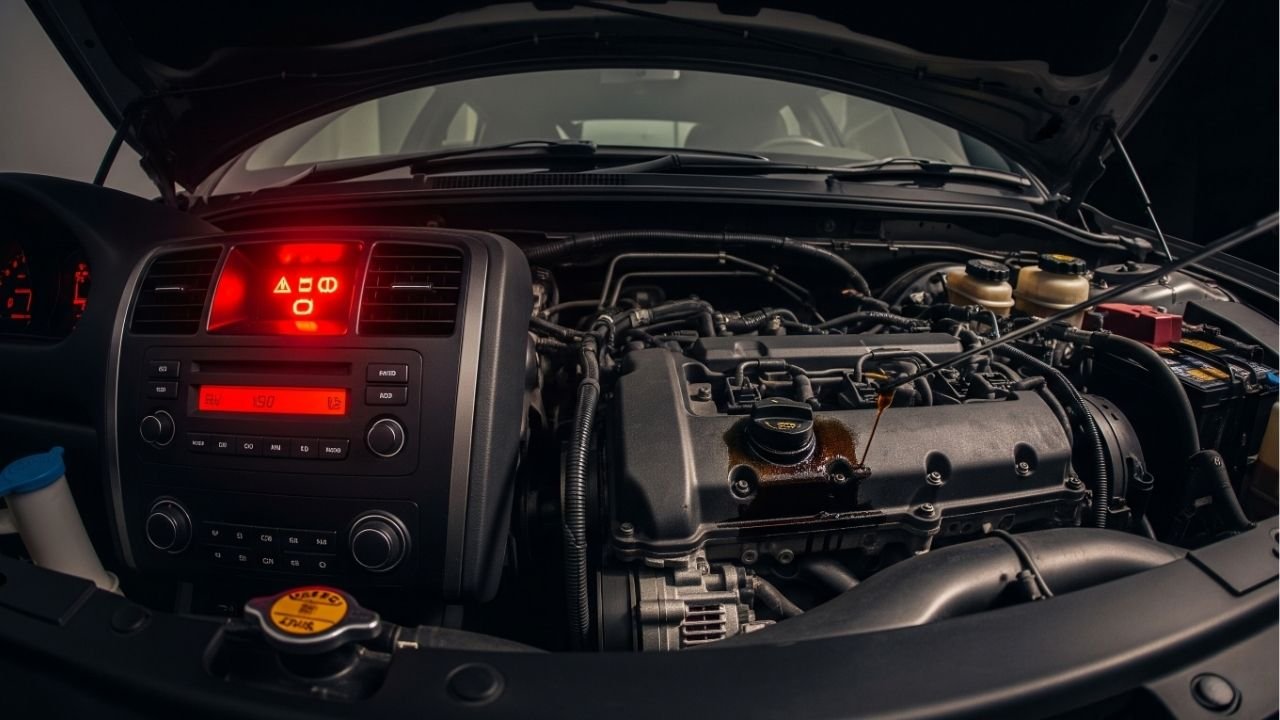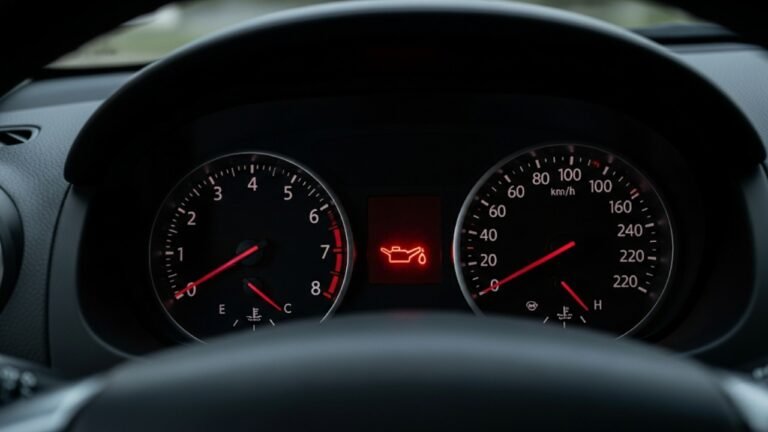What Happens If Engine Oil Is Low in Car? A Friendly Guide

Let me ask you something—have you ever checked your engine oil and found it lower than expected? It might not seem like a big deal at first. Maybe you’re running late for work or just too tired after a long day. But let me tell you something from experience: low engine oil isn’t just an inconvenience—it’s a silent killer for your car.
Most people don’t think twice about it until their engine starts making weird noises or, worse, gives up completely. In this article, we’re going to dive deep into what happens if engine oil is low in car, why it’s important, and what you can do to avoid costly repairs or breakdowns.
Whether you’re a first-time car owner or someone who’s been driving for years, this is the kind of stuff that can save you thousands—no exaggeration. So buckle up and let’s talk engine oil.
Why Engine Oil Is the Lifeblood of Your Car

Let’s break it down a bit:
-
Lubrication: Oil reduces friction between the pistons, crankshaft, and other moving components.
-
Cooling: It absorbs heat generated by engine movement.
-
Cleaning: It carries away dirt and debris.
-
Protection: It prevents rust and corrosion.
So when levels are low, all these protections start to vanish. It’s like walking through a sandstorm with no goggles or face mask. You’re bound to get hurt.
First Signs Your Engine Oil Is Running Low
Now, you don’t need to be a mechanic to spot the warning signs. Most modern cars will give you some kind of alert, but here are the early symptoms to watch out for:
-
The oil warning light on your dashboard flickers or stays on.
-
You hear a ticking or knocking sound from the engine.
-
The engine runs hotter than usual.
-
There’s a burning oil smell inside or outside the car.
-
Decreased fuel efficiency or sluggish performance.
Think of these signs like your car crying for help. If you ignore them, it’s only a matter of time before things get worse.
What Happens If Engine Oil Is Low in Car?
Here’s the big question. What really happens if engine oil is low in car? The short answer? A chain reaction of disasters. The long answer? Let’s break it down in real, simple terms.
1. Engine Overheating
Without enough oil, your engine loses its ability to regulate heat. Parts start rubbing together, creating friction, and the temperature rises fast. It’s like running full speed on a treadmill wearing flip-flops—dangerous and unsustainable. Overheating is one of the first things you’ll notice when oil is low, and it can warp engine components like cylinders and pistons.
Pro Tip: If your temperature gauge spikes suddenly, pull over and check the oil level before continuing. It could save your engine.
2. Increased Friction and Wear
Oil acts like a cushion between metal parts. Without it, you’re looking at metal-on-metal contact. That might sound harmless, but it’s brutal on your engine. Pistons, camshafts, and bearings wear down quickly without lubrication, which leads to poor performance and expensive repairs.
Imagine scraping your bare hand along a concrete wall over and over. That’s what your engine components go through without oil.
3. Strange Noises from the Engine
If your engine sounds like it’s rattling, ticking, or knocking—it’s trying to tell you something. These sounds usually come from valve lifters or the crankshaft struggling to move freely because there isn’t enough oil. Left unchecked, these sounds will turn into silence… because the engine will eventually seize.
Real-Life Consequences of Ignoring Low Engine Oil
To really hammer this home, let me share a quick story. My friend Rafi from Dhaka once told me his Toyota Corolla started acting up. He ignored the oil light for a week—busy with work and life, like we all are. One day, while on the Dhaka-Mymensingh highway, his engine seized completely. He had to tow it back home, and the repairs cost him over 1.5 lakh taka. All of that… because of a simple oil check he skipped.
Moral of the story? Low oil isn’t a “maybe later” problem—it’s an “act now” issue.
How Long Can You Drive with Low Engine Oil?
Short answer: not long at all. You might get away with a few kilometers if the level is just slightly below the mark, but if it’s critically low, driving even a few minutes can cause permanent damage.
Here’s a quick table to help you understand the risk levels:
| Oil Level | Symptoms | Risk Level | Action Needed |
|---|---|---|---|
| Full or near full | Engine running smoothly | Safe | Just monitor regularly |
| Slightly low | Occasional noise, slight heat | Moderate | Top off oil as soon as possible |
| Critically low | Knocking, overheating | High | Stop driving, refill immediately |
| No oil at all | Car won’t start or seized | Severe (100%) | Tow to mechanic, major damage |
Emotional Toll of Engine Failure
Let’s not sugarcoat it—car problems can mess with your mental peace. You’re stuck, late, and possibly looking at a massive repair bill. It feels frustrating, embarrassing, and stressful—especially if it happens on a busy street or in the middle of a trip. And in places like Bangladesh, where reliable roadside help isn’t always close by, it can feel even worse.
Taking five minutes every two weeks to check your oil can prevent all of that. Think of it like brushing your teeth. Small task, big result.
Bullet Recap: What Low Engine Oil Can Lead To
-
Engine overheating and potential failure
-
Increased wear and tear on moving parts
-
Loss of fuel efficiency
-
Strange ticking or knocking noises
-
Engine seizure or complete breakdown
-
Costly repair bills (or even engine replacement)
How to Check If Your Engine Oil Is Low
You don’t need to be a car expert to check your oil. It’s one of the simplest maintenance tasks you can do, and it can literally save your engine. Here’s a quick guide:
-
Turn off your engine and let it cool.
Wait at least 10 minutes after driving to get an accurate reading. -
Pop the hood and find the dipstick.
It usually has a brightly colored handle—yellow or orange. -
Pull the dipstick out and wipe it clean.
Use a tissue or cloth to clean off the oil completely. -
Reinsert the dipstick fully, then pull it out again.
This time, check the level. It should be between the minimum and maximum marks. -
Check the oil’s color and texture.
Clean oil is amber or golden. If it’s black or gritty, it might be time for an oil change.
If the oil level is low, add the right type of oil for your car. Make sure not to overfill it—that can be just as bad.
Why Low Engine Oil Is More Dangerous in Older Cars
Older cars are like our elders—they need a bit more love and care. As engines age, seals start to wear down, which leads to oil leaks or burning more oil during combustion. That’s why low engine oil is an even bigger issue in older models.
If you’re driving something over 10 years old, like a Toyota Premio or an old Honda Civic, keep a closer eye on the oil. You might need to top it off more frequently—even between regular oil changes.
A little vigilance goes a long way here. Older engines are more sensitive to oil levels, and they don’t bounce back from damage the way newer engines do.
Regular Oil Changes: Your Best Defense
Prevention is better than cure—and nowhere is that truer than when it comes to oil. Regular oil changes flush out dirty oil, remove harmful debris, and replenish lost oil volume.
Depending on your car and oil type:
-
Conventional oil: change every 3,000–5,000 km
-
Synthetic oil: change every 7,500–10,000 km
Pro tip: Set a calendar reminder or keep a log in your glove box. It’s a small habit that builds big car health.
Also, always replace the oil filter during an oil change. The filter traps sludge and dirt—if it’s clogged, your oil can’t do its job properly.
The Cost of Ignoring Low Engine Oil
You might think, “I’ll deal with it later.” But delaying can cost you more than money. It can leave you stranded, frustrated, and scrambling for help. Here’s a breakdown of potential costs:
| Issue from Low Oil | Estimated Cost (BDT) |
|---|---|
| Engine Overheating | 10,000–20,000 |
| Camshaft or Crankshaft Damage | 30,000–50,000 |
| Full Engine Rebuild | 1,00,000–2,00,000 |
| Engine Replacement | 2,50,000+ |
Compare that to the cost of a liter of engine oil (about 600–1000 BDT). The math is obvious.
Cultural Insight: Car Care Habits in South Asia
In South Asian countries like Bangladesh, India, or Pakistan, it’s common for people to rely on drivers or roadside mechanics for car care. That’s totally fine—but don’t outsource your awareness. Even if someone else changes the oil, make it a habit to check the dipstick yourself once in a while.
In our hot and humid climate, engines run harder, especially during traffic jams. That makes engine oil even more crucial, not less. You don’t need to be a car enthusiast—just a little bit curious and proactive.
The Emotional Relief of a Healthy Engine
When your engine runs well, you feel safe, confident, and at ease. No unexpected breakdowns. No weird noises. Just smooth rides and peace of mind.
That sense of relief? It comes from knowing you’ve done your part—like taking vitamins or drinking enough water. Your car gives back what you give it.
So if you’re ever wondering, “what happens if engine oil is low in car?”—remember this:
It’s not just about mechanics. It’s about freedom. Reliability. Trust in your ride. And that’s worth every minute you spend under the hood.
Final Thoughts: Love Your Engine, It Loves You Back
Cars might be machines, but they behave a lot like people. When they’re neglected, they break down. When they’re cared for, they perform. And just like relationships, communication is key—those warning lights, noises, and smells are your car’s way of talking to you.
So next time you wonder if it’s worth checking your oil, don’t overthink it. Just pop the hood, pull the dipstick, and do the check. It’s five minutes that could save you five figures.
Take care of your car, and it’ll take care of you. Simple as that.
Bonus FAQs (More You Might Be Wondering)
1. How often should I check my engine oil?
At least once every two weeks or before a long trip. Use the dipstick to see the level.
2. Can I top up oil myself, or do I need a mechanic?
Yes, you can top it up if you know the correct type of oil for your engine. Just don’t overfill it.
3. What if the oil warning light goes off but oil level looks fine?
It could be a faulty sensor or low oil pressure. Get it checked professionally.
4. How do I know which oil is right for my car?
Check your owner’s manual or ask your trusted mechanic. Different engines need different oil grades.
5. Is synthetic oil better for preventing low oil problems?
Synthetic oils often last longer and perform better in extreme temperatures, making them a good choice for long-term protection.
6. Can I mix old and new engine oil?
Yes, but it’s not ideal. If you’re in a pinch, it’s okay. Just plan for a full oil change soon.
7. Does low engine oil affect mileage?
Absolutely. The engine works harder with less lubrication, which can hurt fuel economy.
8. What if the oil is full, but still looks dirty?
That’s a sign it’s time for an oil change. Dirty oil can’t protect your engine properly.






